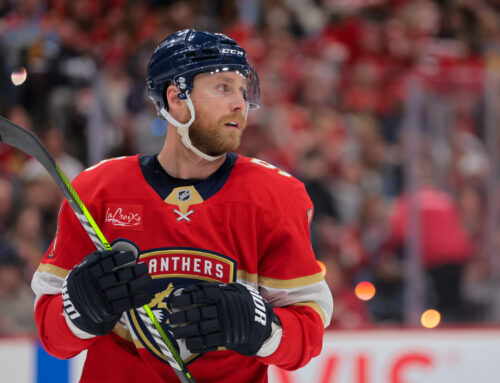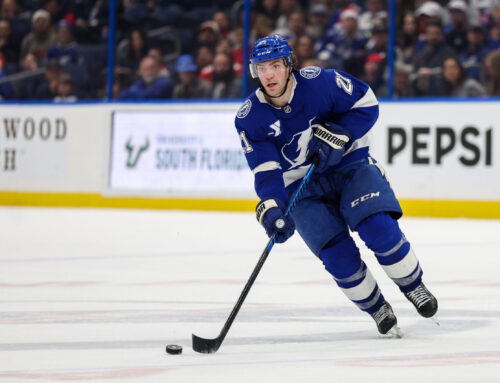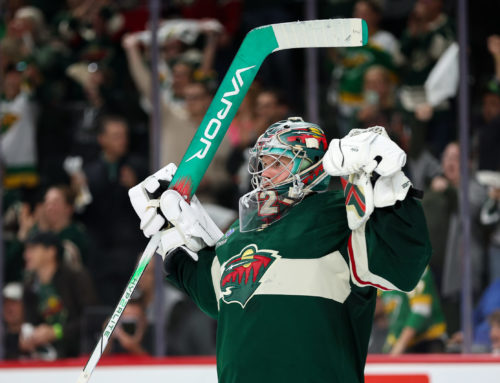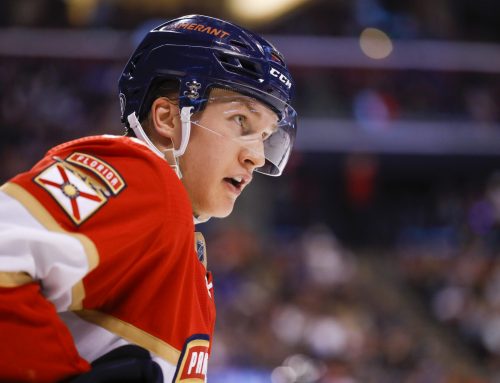
A good one here – Eberle vs. Couture, who would you rather own? Rick Roos breaks it down…
What honor could be more prestigious for Logan Couture than leading the 2016 Playoffs in scoring? Appearing in Cage Match of course – against Jordan Eberle! Can Couture carry his magic into 2016-17 and beyond; and will Eberle bounce back after a disappointing 2015-16? Let’s fire up this Cage Match and find out!
Career Path and Contract Status
Couture, 27, was selected ninth overall in 2007 but returned to the OHL for two seasons, culminating in 87 points in 2008-09 (ninth in scoring). Couture’s 53 points in 42 AHL contests for 2009-10 proved he was NHL ready; and sure enough Couture tallied a very solid 56 points for San Jose in 2010-11, then climbed to 65 for 2011-12. Couture had 91 points in 113 (66 point full season pace) over the next two seasons, then rose to 67 points. Along the way, he potted 21+ goals in each season from 2010-11 to 2014-15, making him one of only nine NHLers to accomplish that feat.
Until the playoffs, 2015-16 had been a season to forget for Couture, with injury issues limiting him to six contests before January and, ultimately, subpar production. But with 30 points in 24 playoff games, he became one of three players (Claude Giroux, Ryan Getzlaf) to average 1.25+ points per game in 10+ playoff games in a single season within the last five years and one of only four (Evgeni Malkin, Sidney Crosby, Daniel Briere) to post 30+ points in one playoff campaign since 2000-01, with each of these others having hit 91+ points during at least one regular season.
Eberle, 26, was drafted 22nd overall in 2008. He also returned to juniors for two more seasons, the second seeing his production explode to 106 points, good for second in scoring (and in only 57 games). In the NHL to stay for 2010-11 ala Couture, Eberle posted 43 points in 69 games, which was respectable but led few to expect what came next, namely 76 points in 2011-12. From there it was 37 points in 48 games during lockout-shortened 2012-13, then 63+ points in 2013-14 and 2014-15, making Eberle one of only three players then age 25 or younger (John Tavares, Steven Stamkos) to average 0.75+ points in each of the four seasons from 2011-12 to 2014-15.
Like Couture, the early part of 2015-16 was a time to forget for Eberle. He missed October to injury then had only three points in 13 games. Eberle also lost steam toward the end of the season, with only seven points in his final 16 games. But sandwiched in between was a scorching 37 points in 40 games.
For the second week in a row, there’s a first for Cage Match. Here it’s 100% identical contract numbers for the profiled players – their deals run through 2018-19, count $6M per season against the cap, and leave them UFAs at completion. The only difference is Couture has a modified NTC.
Ice Time
|
Season |
Total Ice Time per game (rank among team’s forwards) |
PP Ice Time per game (rank among team’s forwards) |
SH Ice Time per game (rank among team’s forwards) |
|
2015-16 |
17:23 (L.C.) – 4th 17:51 (J.E.) – 5th |
3:39 (L.C.) – 1st (tied) 2:38 (J.E.) – 3rd |
0:44 (L.C.) – 10th 0:01 (J.E.) – 14th |
|
2014-15 |
19:04 (L.C.) – 3rd 19:02 (J.E.) – 3rd |
3:12 (L.C.) – 3rd 2:37 (J.E.) – 2nd |
1:27 (L.C.) – 3rd 0:04 (J.E.) – 14th |
|
2013-14 |
18:56 (L.C.) – 3rd 19:32 (J.E.) – 3rd |
3:23 (L.C.) – 4th 3:02 (J.E.) – 2nd |
1:21 (L.C.) – 3rd 0:41 (J.E.) – 9th |
|
2012-13 |
18:05 (L.C.) – 4th 18:59 (J.E.) – 2nd |
3:07 (L.C.) – 3rd 3:11 (J.E.) – 2nd |
0:53 (L.C.) – 7th 0:11 (J.E.) – 12th |
Although Couture’s Total Ice Time was down nearly 10% in 2015-16, not only was his PP Time higher than in his previous three seasons, but his SH Ice Time was cut in half from 2014-15. Also, his ranking among Sharks forwards in Ice Time was virtually the same as the past three seasons, plus his PP Time rank was tied for first. Thus, while he did have an injury excuse, Couture’s decline in production was seemingly more than it should’ve been.
Of course, Couture received 19:21 per game during the playoffs and responded with league-leading scoring. But we have to keep in mind the Sharks played 71:45 of OT, which means Couture’s Ice Time per 60 minutes was actually 18:36. Even still, that’s considerably above his regular season average, Plus, Patrick Marleau and Joe Thornton will start 2016-17 as 37-year olds, so chances are their Ice Time will drop just as it has over the past few seasons, with Couture a beneficiary.
In all, the stage seems set for Couture to quickly regain at least a chunk of his lost Total Ice Time. The question is whether, in doing so, he’ll only rebound to his usual 65 point scoring pace or if what we saw during the playoffs suggests a leap into 70+ territory.
Eberle’s drop in Ice Time is difficult to explain. Digging deeper, it wasn’t being eased into the line-up after injury, nor lower minutes when his production waned as the season wound down. In fact, there was only one month where his Ice Time for more than half that months’ games was below his season-long per game average, and that was during February, when he produced 16 points in just 14 contests.
A looming Ice Time influencing factor for Eberle is what happens in Edmonton between now and October. Assuming Eberle himself isn’t dealt, someone within the top six could be. And although the team might add a forward via free agency or give a spot to a non-scorer (e.g., Patrick Maroon), there’s a good chance that Eberle could receive some “addition by subtraction” Ice Time.
Secondary Categories
|
Season |
PIMs (per game) |
Hits (per game) |
Blocked Shots (per game) |
Shots (per game) |
PP Points (per game) |
|
0.38 (L.C.) 0.20 (J.E.) |
0.55 (L.C.) 0.40 (J.E.) |
0.73 (L.C.) 0.33 (J.E.) |
2.63 (L.C.) 2.50 (J.E.) |
0.29 (L.C.) 0.16 (J.E.) |
|
|
2014-15 |
0.14 (L.C.) 0.29 (J.E.) |
1.03 (L.C.) 0.76 (J.E.) |
0.86 (L.C.) 0.44 (J.E.) |
3.20 (L.C.) 2.26 (J.E.) |
0.29 (L.C.) 0.26 (J.E.) |
|
2013-14 |
0.30 (L.C.) 0.22 (J.E.) |
0.24 (L.C.) 0.63 (J.E.) |
1.04 (L.C.) 0.50 (J.E.) |
3.58 (L.C.)
📢 advertisement:
2.50 (J.E.) |
0.20 (L.C.) 0.25 (J.E.) |
|
2012-13 |
0.08 (L.C.) 0.33 (J.E.) |
0.66 (L.C.) 0.64 (J.E.) |
1.06 (L.C.) 0.33 (J.E.) |
3.14 (L.C.) 2.77 (J.E.) |
0.25 (L.C.) 0.18 (J.E.) |
When Couture missed games due to injury (2015-16 and 2013-14), his PIM rose but Hits fell; maybe just a coincidence, but worth noting. On a clear downward trend is Couture’s Blocks, which is unfortunate since no other forward played 100+ games from 2012-2014 averaging 1+ Block per game in each season.
Seeing Couture’s SOG rate drop below three per game is concerning, especially since he’d been above that threshold every full season of his NHL career. Plus, this wasn’t him suddenly getting more selective; his average shot distance was 32.1 feet in 2014-15, 31.5 in 2015-16. There’s some solace in his SOG rate being 2.71 in his productive playoffs; but that was just 24 games, and Couture has been red hot for short bursts in the past, including 17 points in 18 games in 2015-16. In other words, concern about his SOG rate is not alleviated by his ability to produce well during the playoffs despite shooting less.
Eberle’s PIM and Blocks have been stable. His Hits weren’t poor until this season, and he gets some benefit of doubt that he was holding back due to lingering concern over his injury. Even still – Couture is better in these multi-cat areas, albeit not significantly. Like Couture, Eberle’s 2015-16 SOG rate can be viewed in diferent ways. On one hand, Eberle’s SOG rate didn’t change versus the average of his previous three seasons, so there’s less concern he’s slipping. Then again, with it being unchanged, we have to wonder why his production wasn’t more in line with those seasons.
Looking at PPP might help explain/justify Eberle’s substandard 2015-16, as his per game rate was down more than 33% versus his past two seasons. In Couture’s case, despite his poor overall production for 2015-16 his PPP held steady from his 67 point 2014-15. Overall, there’s more good than bad in that, as it shows Couture responded to being given more PP Time and thus he’s likely to retain it.
Luck-Based Metrics
|
Season |
Personal Shooting Percentage |
PDO/SPSV (5×5) |
IPP (5×5) |
IPP (5×4) |
Offensive Zone Starting % (5×5) |
|
2015-16 |
10.9% (L.C.) 14.5% (J.E.) |
995 (L.C.) 976 (J.E.) |
65.4% (L.C.) 76.9% (J.E.) |
55.0% (L.C.) 63.2% (J.E.) |
51.2% (L.C.) 52.9% (J.E.) |
|
2014-15 |
10.3% (L.C.) 13.1% (J.E.) |
992 (L.C.) 989 (J.E.) |
71.7% (L.C.) 73.2% (J.E.) |
55.3% (L.C.) 79.2% (J.E.) |
50.8% (L.C.) 63.7% (J.E.) |
|
2013-14 |
9.9% (L.C.) 14.0% (J.E.) |
1018 (L.C.) 1000 (J.E.) |
68.2% (L.C.) 74.0% (J.E.) |
52.2% (L.C.) 72.0% (J.E.) |
46.0% (L.C.) 55.8% (J.E.) |
|
2012-13 |
13.9% (L.C.) 12.0% (J.E.) |
1012 (L.C.) 985 (J.E.) |
82.8% (L.C.) 81.8% (J.E.) |
66.7% (L.C.) 50.0% (J.E.) |
50.2% (L.C.) 51.1% (J.E.) |
Our main focus is 2015-16, to see if either player was victimized by unsustainable bad luck justifying his drop in production. For Couture, nothing sticks out. His OZ% was a bit higher, but that was balanced out by combined IPPs which, while slightly lower than his norm, were on par with 2013-14 (54 points in 65 games). Couture’s Shooting % in the playoffs was 15.4%; yet due to him only taking 65 playoff shots he only received 2.5 more goals than had he shot at his career mark (11.6%).
Eberle’s Shooting Percentage runs high; in fact, for his career it’s 14.1%, making him one of five players (Jonathan Toews, Steven Stamkos, Corey Perry, Sidney Crosby) to have fired 1000+ shots since 2010-11 and scored on 14%+ of them. We also see more evidence Eberle’s 2015-16 PP output was abnormally low, namely his 5×4 IPP. Yet his 5×4 IPP wasn’t so low as to explain his overall scoring drop. His OZ% also was low, but that’s a wild card. Overall, this paints a picture that Eberle’s poor season might be an outlier due to unsustainably low PPP, a very slow start after missing the preseason and October, and somewhat unsustainably lower than expected OZ%.
Who Wins?
Going into 2015-16, a case could be made that Couture was at least somewhat overvalued in relation to Eberle, as Couture was taken, on average, at pick 26 in Yahoo drafts, compared to 42 for Eberle, and despite Eberle’s 68 point full season scoring pace from 2010-2015 versus 66 for Couture. And Couture should see his cost increase due to his postseason success trumping, via recency bias, his poor 2015-16 regular season output and despite signs he’s seemingly more similar to the player he’s previously been than what he briefly showed in the playoffs.
Meanwhile, Eberle’s cost should decrease after his 2015-16. And as we saw above, several factors suggest he should be able to return to at least his previous levels of production in 2016-17, thus making him the winner of this match.
If you own Couture, see if someone became enamored enough by him after the playoffs to blow you away with an offer. If you want to acquire him, the good news is if he merely performs at his usual 65 point level then his price should go down due to the perception of him disappointing in relation to his runaway playoff success. The concern is whether owning Couture long term is wise, due, in particular, to his possibly decreasing SOG rate. Plus, although Thornton and/or Marleau’s may depart when their deals expire next summer, if that happens Couture – and other Sharks forwards – might not majorly benefit despite more Ice Time, what with teams keying more on players like Couture and Joe Pavelski.
Meanwhile, Eberle seems like a good candidate to draft in one-year leagues or to pursue in keepers. If he happens to be traded, chances are his new team would likely insert him into a similar, if not better overall situation, so don’t be scared away if that happens.





 CHI
CHI N.J
N.J MTL
MTL CBJ
CBJ BOS
BOS PIT
PIT DET
DET L.A
L.A ANA
ANA COL
COL S.J
S.J
